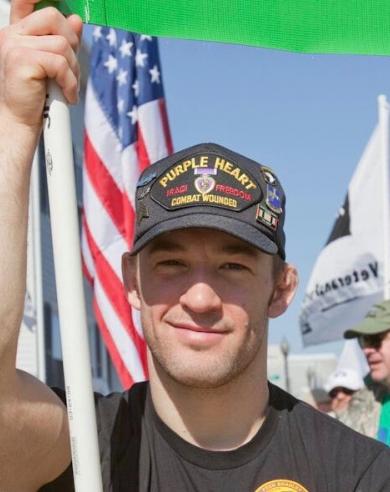Leader Spotlight: Travis Weiner
As part of United Religions Initiative North America’s #TangibleHope campaign, Veterans for American Ideals is recognizing veteran leaders who are continuing their service by building unity and standing up for American values. Through a series of interviews, we’re asking VFAI leaders to share more about how their service shaped them and what responsibility they feel veterans have to speak up on issues that relate to our national ideals.
Today’s interview is with Travis Weiner, a U.S. Army veteran and a law student at the University of Colorado, Boulder.
Tell me about your military service.
I served with the Army, 101st Airborne Division, 502nd Infantry Regiment, from 2004 to 2009 with a couple of tours in Iraq. I joined out right of high school for a number of reasons. I wanted to serve my country, especially during a time of war, and something bigger than myself. I also wanted to experience the military and the training it had to offer.
How did your service shape the person you are today?
Anybody who does a combat tour changes in some way, big or small, one way or another. I think that it gave me a lot of perspective. It gave me an appreciation for life, how fragile and short it is and can be, and it was a good experience in the sense that I met a lot of people with different backgrounds and views. I gained an understanding of how important some of the issues in the world are, and that they are not just abstract issues. They affect people’s lives.
Some people come out of the military with a lot of military-like tendencies. I retained some, but not others. Some also exit the military with a heightened, inherent respect for institutional authority. But in some ways, it probably made me have less respect for authority. Don’t get me wrong—I met, still respect, and would still follow some great leaders in the Army. But by-and-large the military made me intuitively questioning and skeptical of the way things work—in the military, in the political process, and in general. It taught me that you have to fight and work for what you believe in, because as they say in the military, it won’t get done otherwise.
As a veteran, what sort of responsibility do you feel to speak up on issues that relate to American ideals?
I feel a responsibility to speak out about issues that affect our standing in the world, our moral and ethical reputation, and our national security.
Probably one of the last issues with bipartisan support is support for the troops. I think it’s important to realize that being on the right side of some of the issues that VFAI advocates for is supporting the troops. Do the people who fought alongside us deserve to live here? I think most vets who served with an interpreter, and most citizens of this country, would say yes—but they don’t know what’s going on. It’s our responsibility to get this message out there, to tell people, for example, about the people who helped us when we were overseas.
As a vet, I feel responsible to use my experience as a gateway for support on these issues.
Tell me about one issue related to those ideals that is of particularly important or concerning to you right now. What are you doing about it?
The Special Immigrant Visa program for interpreters and translators is one. But I’m also concerned about larger immigration issues and the refugee crisis. I’ve been working with Vets for American Ideals to advocate on these issues. One of our fights is to get more money for the Office of Refugee Resettlement. Refugees from Syria and from Iraq and Afghanistan, whether they were interpreters or not, need our help. Through my law program I’ve also been volunteering at immigration centers and in immigration court to learn the system and help people in that way.
What would you say to other veterans about the role that they can play in these issues as citizens?
You forget the power that you have as a vet. People really listen. So I would say, it doesn’t take much for you to get involved in a positive way. If you live in a state where your Representative or Senators could help change something, you have to reach out to them. You’ve got to get involved, speak to the media, do what you can to put pressure on them to make better decisions. I am prone to forgetting this myself, but you can also make a difference one-on-one, changing one mind or educating one person at a time.
Speak up, and don’t leave anyone behind. I think the SIV issue in particular is something we can all get behind.


